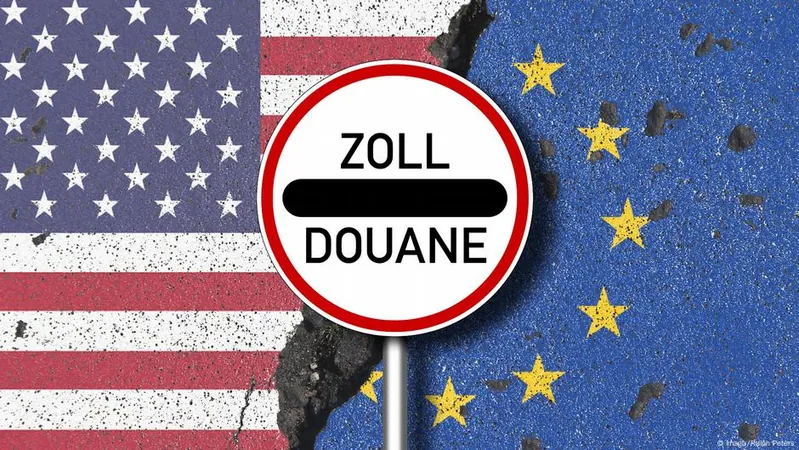
The EU's Gamble: How to Combat Trump's Aggressive Trade War
2025-03-29
Author: Emma
Introduction
In a bold proclamation, US President Donald Trump has dubbed tariffs as his 'favorite word.' However, across the Atlantic, the European Commission is bracing for a confrontational trade relationship, labeling Trump's trade policies as an 'act of economic self-harm.' As the potential of a transatlantic trade war looms, Brussels is caught in a challenging position where it must exhibit strength while also nurturing its historical alliance with the United States.
Concerns Over Potential Tariffs
According to Maros Sefcovic, the European Union's top trade official, there are growing concerns that Trump may implement a staggering 20% tariff on all EU goods entering the US by early April. This move would dramatically inflate the prices of European products in the American market. The uncertainty remains whether these tariffs will be applied universally to the EU or targeted at specific nations within the bloc.
Current Tariffs and Their Impact
Currently, the EU is already grappling with the repercussions of 25% tariffs on steel and aluminum imposed by the US, along with additional tariffs affecting the European automotive sector that have been instituted in recent months.
EU's Response Strategies
To mitigate these challenges while safeguarding the interests of European consumers, the EU has several strategies in its arsenal. One prominent option is to retaliate by imposing restrictions on US services, which could severely affect major American companies operating within Europe. The EU may contemplate limiting the intellectual property rights of US tech giants like Apple and Google, potentially preventing them from charging for certain digital services or updates. Furthermore, there are discussions concerning the withdrawal of government contracts from Elon Musk's Starlink satellite network.
Trade Surplus Dynamics
Significantly, in 2023, the EU recorded a remarkable goods surplus of €157 billion (approximately $170 billion) with the US, indicating it imports more than it exports. However, this dynamic flips when it comes to services, where the US has a surplus of €109 billion against the EU, raising the stakes for both sides.
Symbolic Retaliatory Measures
To date, the EU's retaliatory measures have primarily been symbolic, impacting American products like Harley Davidson motorcycles and denim jeans. Any future tariffs would require the consensus of a qualified majority among EU member states, illustrating the intricate political landscape Brussels must navigate. France has already advocated for an exemption on bourbon whiskey tariffs to protect its own wine industry from potential US retaliation.
The Anti-Coercion Instrument (ACI)
The introduction of the EU's Anti-Coercion Instrument (ACI) in 2023 is a critical factor in this economic duel. Designed to counteract coercive trade measures, the ACI could empower the EU to take significant retaliatory actions should it conclude that Trump’s approach constitutes economic coercion. This 'trade bazooka' could include targeted restrictions on US banks operating in Europe, revoking US patents, or limiting access to revenue streams for online streaming services.
Support for ACI
Prominent European trade figures, such as former EU Trade Commissioner Cecilia Malmström, have championed the ACI as a crucial tool for counteraction. This could permit the EU to target individuals or companies closely connected to the Trump administration, potentially affecting high-profile names like Elon Musk.
Enforcement of Existing Laws
In addition to tariffs, the EU may also enforce its existing laws to constrain US tech giants. Experts suggest that penalties under the Digital Services Act (DSA) and Digital Markets Act (DMA) could be leveraged to impose hefty fines on platforms that fail to manage misinformation effectively. Notably, the EU is currently investigating allegations regarding the spread of far-right content on Musk's platform, X, during European elections and could pursue these inquiries aggressively.
Potential Consequences and Diplomatic Tensions
However, experts caution that such measures against US tech firms could escalate diplomatic tensions and have adverse effects on European consumers. Trump's administration has labeled EU laws like the DMA and DSA as non-tariff barriers that place disproportionate financial burdens on US enterprises, framing the conflict within a larger narrative of economic rivalry.
Conclusion
As the EU prepares to act, the balance of economic power teeters precariously on the edge of a trade war, with both sides keenly aware that stakes have never been higher. The question remains: Will this confrontation lead to mutual economic jeopardy, or can diplomacy salvage the transatlantic partnership? Only time will tell.









 Brasil (PT)
Brasil (PT)
 Canada (EN)
Canada (EN)
 Chile (ES)
Chile (ES)
 Česko (CS)
Česko (CS)
 대한민국 (KO)
대한민국 (KO)
 España (ES)
España (ES)
 France (FR)
France (FR)
 Hong Kong (EN)
Hong Kong (EN)
 Italia (IT)
Italia (IT)
 日本 (JA)
日本 (JA)
 Magyarország (HU)
Magyarország (HU)
 Norge (NO)
Norge (NO)
 Polska (PL)
Polska (PL)
 Schweiz (DE)
Schweiz (DE)
 Singapore (EN)
Singapore (EN)
 Sverige (SV)
Sverige (SV)
 Suomi (FI)
Suomi (FI)
 Türkiye (TR)
Türkiye (TR)
 الإمارات العربية المتحدة (AR)
الإمارات العربية المتحدة (AR)